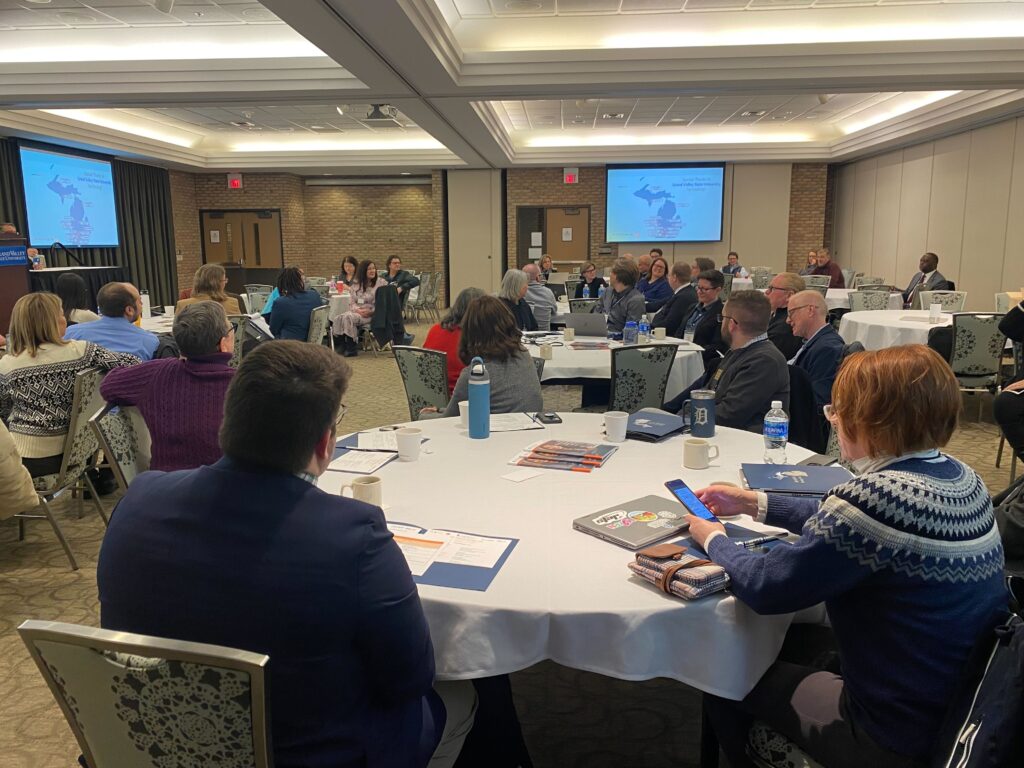The state of Michigan recently celebrated the accomplishment of more than 1,000 students who, thanks to tuition support from Michigan Reconnect, graduated from community colleges statewide.
The first-ever virtual celebration, featuring a congratulatory address by Gov. Gretchen Whitmer, was fitting recognition for the hard work of students 21 and older, determined to build better lives for themselves and their families.
The event also served as a reminder of the opportunity before us to help more adult learners experience the same success.
Tuition support is critical, and Reconnect plays a huge role in this. Since its launch in 2021, the program has helped more than 5,500 students earn associate degrees. But adult students also need help beyond tuition support in overcoming the unique barriers they face to completing their education.
And with 2.5 million adult Michiganders lacking a postsecondary credential, we have the opportunity to do so much more. This population is central to the state’s goal to increase the number of working-age adults with a skill certificate or college degree from 51.1% today to 60% by 2030.
Postsecondary institutions in Michigan and around the nation have implemented a range of promising strategies to support adult learners. We outlined several in our 2023 report, Adult Postsecondary Education in Michigan & Beyond. These include:
1. Conduct intentional outreach
Adult learners can pursue education only if they are aware of the programs and services available to them. To raise awareness, we need broad outreach (e.g., media campaigns and advertisements) highlighting the value of additional education and certification. But this must also be paired with targeted outreach on an individual level to encourage adults to enter or return to postsecondary programs and to provide supports to those currently enrolled.
2. Promote ease of access
Flexibility within higher education has historically led to increased participation of adult learners. Online, 7- or 8-week courses, and asynchronous learning are examples of flexible scheduling that help ensure time-constrained students can access all necessary courses. But they also need access to support services (e.g., advising, financial aid support) that are flexible as well and available outside of the traditional 9 to 5 business hours.
Accelerated degree programs offer a faster-paced, flexible, and efficient educational experience. These programs reduce the time and financial commitment required for degree completion. They often incorporate prior learning assessments, flexible learning formats, and cohort-based learning, making it easier for adult learners to balance their education with work, family, and personal responsibilities.
3. Eliminate barriers to transfer
For many adults who have begun but have not finished a postsecondary program, returning to complete their education or training is complicated and time-consuming. With simplified transfer processes, adults may be more inclined to leverage the credits previously earned and complete an applicable degree or training program.
One solution is a reverse transfer program: Credits earned at a four-year university are used to fulfill requirements for an associate degree at a community college. Another is encouraging and simplifying seamless transfer between all postsecondary institutions.
4. Recognize prior learning and competency
Prior learning assessments offer a means to evaluate and award academic credit for knowledge and skills adult learners have gained outside of traditional classroom settings. These can be acquired through work, volunteer experiences, military service, or self-directed learning. When granted credit for prior learning, adult learners feel more valued as their skills and knowledge they have gained in their life experience is recognized, which leads to adults being more motivated and engaged in their studies. They also can avoid redundant coursework.
Competency-based education allows adult learners to progress at their own pace, demonstrating their proficiency as they move through their educational program. This approach can help adult learners overcome barriers to enrollment, persistence, and completion in postsecondary education by offering flexibility, personalization, and a direct link to relevant career skills.
5. Provide access to a wide-ranging suite of support services
As is the case for all students, adult learners require support – both in and outside of the classroom. These support systems begin with ensuring students are secure in their basic needs, such as food and housing support. Postsecondary institutions can aid students in meeting these needs by providing holistic advising and supports for adult learners that face challenges with transportation, housing, food assistance and other non-academic barriers..
Active academic support aligns with traditional academic coaching and tutoring. A growing shift to providing these services remotely is a benefit to adult learners. One way to complement active academic support is through proactive advising — identifying at-risk students and addressing needs before they become problematic.
Another promising model is corequisite support. Instead of enrolling in a program and taking a series of remedial courses to get up to speed, students enter immediately into courses contributing to their degree while receiving additional supports to ensure success.
An extension of this model, corequisite remediation, provides for students to again enter immediately into degree-path coursework, but also provides additional instruction on remedial content where students may need additional academic support.
6. Implement guided, career-aligned pathways through college
Guided pathways serve as an integrated, institution-wide approach to student success. They simplify student progress by (1) working with students to identify their education and career goals, (2) guiding them on a clear path to reach those goals, (3) keeping students on their designated path, and (4) monitoring progress.
Career-aligned pathways in postsecondary education and training programs provide structured and clearly defined routes for students to acquire the necessary skills and credentials for in-demand careers. By integrating academic coursework with practical, industry-relevant experiences, these pathways ensure that students are well-prepared for the workforce upon graduation.
Corporate partnership programs involve an institution of higher education forming a partnership with local, regional, or national businesses to facilitate education and training programs for current or potential employees. These programs can tailor education to the needs of the industry, while businesses offer flexibility to employees to spend time receiving additional training.
7. Leverage high quality data to monitor progress and adjust services
Data-driven insights enable institutions to identify at-risk students, target interventions, and allocate resources more effectively. By analyzing factors such as demographics, course enrollment patterns, and academic performance, institutions can develop tailored support services and personalized learning experiences that address the unique needs of adult learners. A high-quality data system is a critical component to support pro-active and holistic advising programs.
Wide-ranging benefits
As the Class of 2024 will discover, individuals with postsecondary credentials are significantly more likely to participate in the workforce, find and maintain employment, and earn higher wages compared to their less educated counterparts.
The benefit extends beyond the individual: Employers have access to a larger skilled talent pool. When the workforce grows and incomes rise, participation in public assistance programs falls. The health of communities, civic engagement, volunteerism, and parents’ involvement in children’s school activities all increase. And at its heart, boosting adult postsecondary enrollment and completion is an opportunity to close demographic gaps in education and economic mobility.
Congratulations to the Class of 2024 for setting the example for how we build a stronger, more vibrant state of Michigan through adult postsecondary success!


